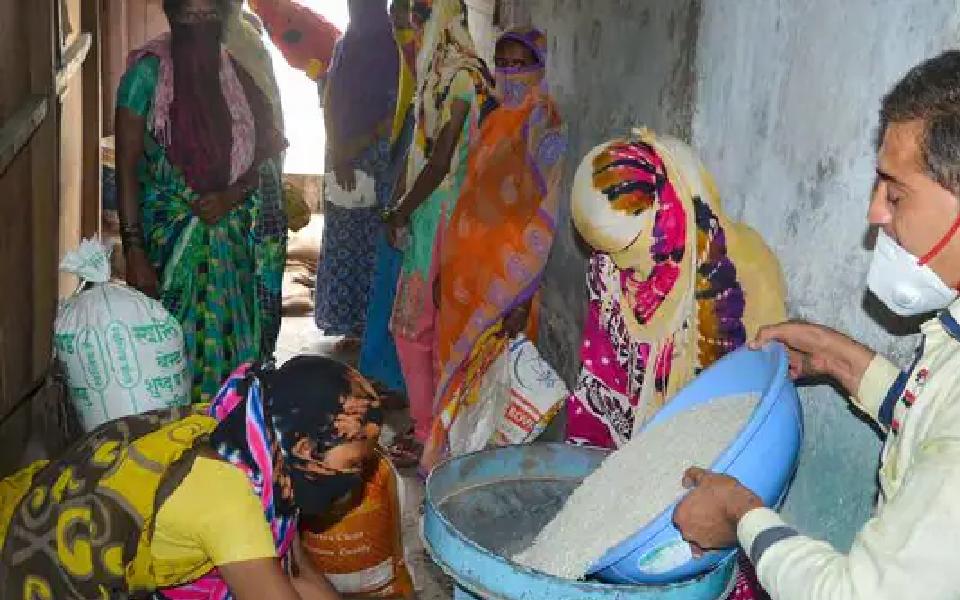Bengaluru, June 20: The AAP-ruled Punjab has come forward to supply rice required for Karnataka's free rice scheme, Anna Bhagya, the party's state unit has said.
The AAP's Karnataka unit said the Punjab government, led by Bhagwant Mann was willing to help Karnataka by providing rice required to implement the scheme, which offers 10 kg of food grain to each member of a family living below the poverty line.
In a letter to Chief Minister Siddaramaiah on Monday, AAP Karnataka convener Prithvi Reddy said, “The AAP government of Punjab is ready to provide the rice required for the implementation of Anna Bhagya scheme in Karnataka.” He stated that he had a detailed discussion on the issue with Punjab Chief Minister Mann.
''Mann reacted positively and has in-principle agreed to supply rice in the state from Punjab,” Reddy claimed.
The AAP strongly believes that irrespective of political differences, all parties must support initiatives that are meant to help people of our country, he said.
ALSO READ: Three-year-old girl killed after being mowed down by reversing goods truck in Mandya
Reddy also took a dig at the BJP government at the Centre for allegedly declining to provide extra rice to Karnataka.
“It is both surprising and sad to note that the BJP led central government has refused to provide extra rice to our state for fulfilment of the new Anna Bhagya scheme proposed by your government,” the AAP state chief said in his letter.
Slamming the Centre, Reddy said the alleged refusal to provide the extra rice not only exposes the 'anti-poor attitude' of the BJP government but also their ''step-motherly'' treatment to non-BJP ruled states”.
Later, addressing reporters he flayed the Congress for coming to power in Karnataka without any prior preparations.
He also charged the Siddaramaiah-led dispensation with completely 'copying' the programmes of the AAP and announcing many hasty guarantees for vote bank politics.
While five kg rice was already being given by the Centre, the state government wants to provide an additional five kg from its resources, according to a senior state government official.
The union government recently discontinued the sale of rice and wheat from the central pool under the Open Market Sale Scheme (OMSS) to state governments. According to an order issued by the Food Corporation of India (FCI), The sale of wheat and rice under the OMSS (domestic) for state governments is discontinued. However, the sale of rice under the OMSS will be continued for northeastern states, hilly states and states facing law and order situations, natural calamities at an existing rate of Rs 3,400 per quintal, it said. The move comes amid the slow progress of the monsoon and rising prices of rice and wheat. Rice prices have increased by up to 10 per cent in the last one year at the mandi level and by 8 per cent in the last one month, as per official data.
According to Siddaramaiah, the state needed 2.28 lakh metric tonnes of rice. On June 12, the FCI had agreed to provide the required quantity of rice but two days later it backtracked, he alleged.
Karnataka has approached the National Consumer Cooperative Federation, National Agricultural Cooperative Marketing Federation, and Central Warehousing Corporation to procure rice.
Let the Truth be known. If you read VB and like VB, please be a VB Supporter and Help us deliver the Truth to one and all.
Panaji (PTI): As part of a crackdown against tourist establishments violating laws and safety norms in the aftermath of the Arpora fire tragedy, Goa authorities on Saturday sealed a renowned club at Vagator and revoked the fire department NOC of another club.
Cafe CO2 Goa, located on a cliff overlooking the Arabian Sea at Vagator beach in North Goa, was sealed. The move came two days after Goya Club, also in Vagator, was shut down for alleged violations of rules.
Elsewhere, campaigning for local body polls, AAP leader Arvind Kejriwal said the fire incident at Birch by Romeo Lane nightclub at Arpora, which claimed 25 lives on December 6, happened because the BJP government in the state was corrupt.
An inspection of Cafe CO2 Goa by a state government-appointed team revealed that the establishment, with a seating capacity of 250, did not possess a no-objection certificate (NOC) of the Fire and Emergency Services Department. The club, which sits atop Ozrant Cliff, also did not have structural stability, the team found.
The Fire and Emergency Services on Saturday also revoked the NOC issued to Diaz Pool Club and Bar at Anjuna as the fire extinguishers installed in the establishment were found to be inadequate, said divisional fire officer Shripad Gawas.
A notice was issued to Nitin Wadhwa, the partner of the club, he said in the order.
Campaigning at Chimbel village near Panaji in support of his party's Zilla Panchayat election candidate, Aam Aadmi Party leader Kejriwal said the nightclub fire at Arpora happened because of the "corruption of the Pramod Sawant-led state government."
"Why this fire incident happened? I read in the newspapers that the nightclub had no occupancy certificate, no building licence, no excise licence, no construction licence or trade licence. The entire club was illegal but still it was going on," he said.
"How could it go on? Couldn't Pramod Sawant or anyone else see it? I was told that hafta (bribe) was being paid," the former Delhi chief minister said.
A person can not work without bribing officials in the coastal state, Kejriwal said, alleging that officers, MLAs and even ministers are accepting bribes.





